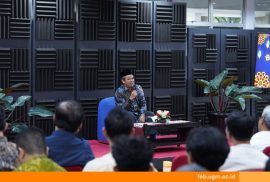Centre for Accounting Management and Micro, Small, and Medium Enterprises (MSMEs) Studies, Laboratory of the Department of Accounting, Faculty of Economics and Business (FEB) UGM has held a webinar with the topic “Scale-Up MSMEs with Gojek: Strategies to Rise Up in the Middle of a Pandemic” on Friday (19/03). The event was started by Achmad Faizal Azmi, S.E., M.Sc., Lecturer at the Department of Accounting, FEB UGM, as the Master of Ceremony (MC). The MC then introduced Aviandi Okta Maulana, Dr., M.Acc., Ak., CA., from the FEB UGM Accounting Laboratory team as the moderator who guided the webinar. Held through the Zoom platform, this webinar was attended by participants ranging from educators, students, practitioners, and MSME owners.
Before getting into the core of the event, Singgih Wijayana, SE, M.Sc., Head of the Department of Accounting, FEB UGM, gave a warm welcome to start the webinar followed by remarks from Dian Kartika Rahajeng, SE, M.Sc., Ph.D., Head of Laboratory Accounting, FEB UGM. Furthermore, the session that was expected came next by presenting speakers at this webinar, Ridzky Novasandro, S.T., M.Sc., Head of the DIY and Central Java District of Gojek, who discussed a topic entitled “UMKM #MelajuBersama Gojek”.
In his presentation, Ridzky explained about the 3 pillars that construct Gojek are speed, innovation, and social impact. In addition, creating a positive social impact by utilizing technology is the basis upon which all innovations at Gojek are based.
According to research by the Demographic Institute of FEB, University of Indonesia (LD FEB UI), this company that has three Super Apps has successfully contributed IDR 104.6 trillion to the Indonesian economy as of 2020.
Based on these pillars and bases, Gojek is here and ready to help MSMEs during this pandemic. Growing with MSMEs has also become part of Gojek’s DNA, given their huge role in Gojek’s development. It is recorded that in 2020 alone, there are 900,000 Gojek merchant partners, 90% of whom are MSME owners.
Gojek continues to create innovative solutions to help small and micro-entrepreneurs in this difficult time in several ways, such as developing the Gojek ecosystem. The five quadrants of the Gojek ecosystem, which include marketing, ordering, payment, and shipping, are expected to provide complete and inclusive solutions for MSMEs. In addition, Gojek also created a Gofood Partner Community (KOMPAG) which became a forum for sharing knowledge and network for Gofood business partners to support MSMEs to progress together. As of October 2020, KOMPAG has more than 67,000 members in 69 cities in Indonesia. “This community allows MSMEs to be able to do cross-learning, cross-sharing, and networking,” added Ridzky.
Not only these two solutions, but Gojek also seeks to work together with the government starting from the Yogyakarta Provincial Government, the Yogyakarta City Government, to the Sleman Regency Government to present free delivery fee promos when customers shop at 28 traditional markets in order to increase MSME transactions. These various solution initiatives from Gojek for MSMEs have proven to be effective in helping MSMEs during a pandemic.
Based on LD FEB UI research in 2020, 94% of MSME partners felt helped and were able to adapt to the pandemic thanks to the Gojek ecosystem initiative. In addition, Gojek has also succeeded in accelerating the transformation of traditional MSMEs into digital businesses thanks to its technological solutions. The strategy to revive MSMEs during this pandemic is in line with one of Gojek’s missions, namely efforts to increase market and technology access to MSMEs in Indonesia. The webinar event ended with a Q&A session from the participants and was answered by Ridzky Novasandro that was led by the moderator.
Reportage: Kirana Lalita Pristy/Sony Budiarso.




